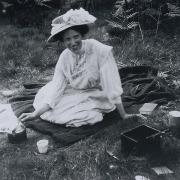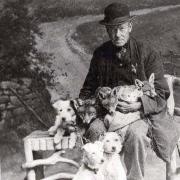Two years ago the first female Honorary Recorder of Derby was appointed. David Marley visits her at Derby Crown Court to discover more about the role of the county’s top judge.

Nirmal Shant was fascinated by the law from a very early age. Growing up in the market town of Long Eaton in the 1970s, she hoped that one day she might become a criminal barrister and used to rush home from school at lunch break to catch a glimpse of her favourite courtroom television drama, Crown Court.
The ground-breaking legal television show, produced by Granada Television and based in the fictional town of Fulchester, started in 1972 and saw actors play the roles of barristers and judges. But in a television twist, the jury was made up entirely of members of the public – and it was down to them to decide whether defendants were guilty.
‘As a young girl there was nothing more exciting than dashing home for lunch to take in a quick half-hour episode of Crown Court on television,’ she says. ‘I was impressed by just how real it felt. Watching how the jury was central to the drama really interested me.’
It was this early exposure to criminal law that struck a chord with Nirmal and it was to shape her future. But not everyone was as positive about her legal aspirations. A teacher at her school in Long Eaton was quick to dismiss her ambitions, telling her to set more realistic goals when assessing her future employment prospects.

‘My teacher was very negative about my future – and when I told her that I wanted to go to university to study law, she suggested that I would be best applying for a job in my local Woolworths store,’ she recalls.
With typically good humour Nirmal rejected the advice and in 1979 she applied to study law at the University of Leicester. For the next three years she excelled in her studies – and on completing her degree even considered diverting away from the law for a career in journalism.
‘To be fair I did seriously think of becoming a journalist – it did, after all, appear to be a very exciting career option. The thought of chasing interesting stories and using language to convey messages was very compelling,’ she explains. ‘But my love of the law ensured that I continued with my childhood career calling.’
Nirmal enrolled on the Bar Vocational Course – the first step on the ladder to becoming a qualified barrister. ‘At the time London was the only place in the country where you could study to become a barrister. I was so excited and set off with great energy and passion,’ she says.
Within a year she had passed the course and quickly secured a legal placement – known as a pupillage – with a top London barristers’ chambers. Over the next six months she mastered the legal craft of being a barrister, before coming back to the East Midlands to conclude her pupillage in Leicester.
‘This really was a wonderful time for me,’ Nirmal recalls. ‘To begin with I did most forms of legal work – but having completed my bar finals in 1984 I was already establishing a clear passion for advocacy and presenting cases in court. And so began my career in criminal law – it slowly became my speciality.’
Nirmal secured a tenancy at the prestigious 1 High Pavement chambers of barristers in Nottingham, and over the next two decades she prosecuted and defended cases in the Crown courts of the East Midlands and beyond.
By 2006 her legal skills were in high demand and she was appointed as a Queen’s Counsel, known to those in legal circles as ‘taking silk’ because of the special gowns worn by these senior barristers. Nirmal had reached the higher echelons of the legal profession.
Nirmal was also becoming a role model for others wanting to start a career in the legal profession. In taking her appointment as a Queen’s Counsel she had become one of the first black and minority ethnic barristers in the East Midlands to hold such a rank. ‘To me that was incredibly special,’ she says. ‘To be appointed as a silk was a truly memorable moment in my legal career. My parents were delighted and I’ll never forget the satisfaction at that time.’
In her final 14 years as a barrister Nirmal also had the opportunity to sit as a part-time judge, known as a recorder. And it was during this time that she realised she wanted to progress further and become a permanent full-time judge.
In 2015 she achieved her aim when she was made a judge by the Judicial Appointments Commission – and with it received a brief to serve at Derby Crown Court.
‘The whole process to become a judge was very rigorous,’ she says. ‘The Commission is an independent body and I had to go through a formal application process, followed by an interview and assessments.’
A year later, when His Honour Judge John Burgess packed up his ceremonial wigs and gowns for a new role at Nottingham Crown Court, Nirmal was promoted to the post of Resident Judge of Derby Crown Court. With it came responsibility for presiding over many of the county’s most serious criminal cases. As Resident Judge she was also charged with coordinating the work of other judges at Derby Crown Court – as well as taking a lead role in the management of justice for a county with a population of almost one million people.
Judge Shant is also required to sentence hundreds of convicted criminals each year, handing down a range of punishments, including terms of imprisonment, rehabilitation orders, community-based penalties and fines.
‘I really enjoy my role as a judge,’ says Nirmal. ‘Every day is so different. But with this role comes great responsibility and that is something I take very seriously.’
Stepping up to judge from a barrister is often a big move. ‘I was fortunate that for over a decade I had served as a part-time judge – and this really helped with my transition,’ she says. ‘What I love about being a judge is that instead of taking part in the confrontational barrister versus barrister battles in court, I can play the role of impartial referee, ensuring fair play is adhered to.’
Nirmal acknowledges the difference from her previous role as a barrister – representing the interests of their clients – when compared to a judge. ‘Without doubt, as a barrister you have to take a very partisan approach to your work. But as a judge it is so liberating to be able to sit as an impartial observer, making decisions in the best interests of everyone in court.’
Nirmal is also eager to ensure her court is accessible and open to all those who come into contact with the judicial system. ‘As a judge I am determined to use as much non-legal jargon as possible,’ she explains. ‘It is crucial that everyone – including victims, witnesses and defendants – all play an effective role in the life of the court. People tend to give their best evidence when they feel comfortable.
‘I do have a public responsibility to occasionally impose custodial deterrents. I have been given the ultimate responsibility to deliver justice – but it is also important to try to balance the needs of victims and offenders in my work. It is a huge responsibility that must be administered with great care.’
Nirmal is eager to acknowledge the changing face of the modern Crown courtroom. ‘There are many more technological tools at the disposal of court staff, barristers and judges now than when I first started as a junior barrister – but it is fair to say that although you will see computers and remote working in the courtrooms of the East Midlands, the core values of the justice system – honesty, fearlessness and integrity – remain the same today.’
Two years ago Nirmal became the first female judge to be appointed as Honorary Recorder of Derby – following in the footsteps of His Honour Judge John Burgess who was the first holder of the role, after Derby City Council decided to revive the historic post in 2008.
The post of Honorary Recorder had been created in the 1970s but the local authority had never taken forward the opportunity to appoint someone to the role until the end of the 2000s. ‘Judge Burgess had a great impact as Honorary Recorder and helped create a stronger link between the institutions of the City of Derby and the Crown Court. I am delighted to be the second holder of the post,’ she says.
In her role of Honorary Recorder Nirmal takes part in a range of ceremonial events and services in the City of Derby. ‘It was a great privilege to attend the service of remembrance to mark the centenary of the end of the First World War at Derby Cathedral last year – it was a very emotional and moving occasion.’
Additionally in her role as Resident Judge she also attends the county’s Legal Service at Derby Cathedral – which involves taking part in a procession followed by a religious service under the direction of the High Sheriff of Derbyshire. ‘When you serve in the Crown Court you are part of the community – and it is really important that you connect with that community. I try to attend everything I can. If I can go, I always go,’ she smiles.
Nirmal says one of the most pleasing aspects of her role is taking part in the High Sheriff’s Annual Award presentations. ‘Along with all of the other judges at Derby Crown Court I really love attending this presentation which acknowledges the bravery of people across Derbyshire who come forward to give good evidence at court – it is very rewarding,’ she says.
Held in the council chamber of Derby City Council, the High Sheriff’s awards see dozens of people given accolades for helping to prevent crime in the county each year. ‘It is so pleasing to have the chance to recognise those people who do something special in deterring crime – it is a very moving occasion to meet those who go beyond the call of duty to help others.’
Nirmal is also quick to praise the staff who serve at Derby Crown Court. ‘We are so fortunate to work in one of the most positive and friendly courthouses in the country. If I could bottle the enthusiasm of the staff who work here, we could make a fortune,’ she smiles.
In her spare time Nirmal and her husband, Narinder Sharma enjoy walking in the Derbyshire countryside. ‘We love to get out and about in the Peak District – there are so many wonderful places to explore. It is so wonderful when my daughters come back home to visit; it is just a shame we don’t see as much of them as we would wish to.’
Judge Shant continues to be as positive about the legal profession as she was when she first watched her favourite television drama as a child. ‘The law remains as interesting as it ever was,’ she smiles. ‘And I am so grateful for the opportunities that I have had.’



























